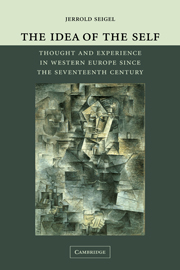Book contents
- Frontmatter
- Contents
- Acknowledgments
- PART I INTRODUCTORY
- PART II BRITISH MODERNITY
- PART III SOCIETY AND SELF-KNOWLEDGE: FRANCE FROM OLD REGIME TO RESTORATION
- PART IV THE WORLD AND THE SELF IN GERMAN IDEALISM
- PART V MODERN VISIONS AND ILLUSIONS
- 13 Dejection, insight, and self-making: Coleridge and Mill
- 14 From cultivated subjectivity to the culte du moi: polarities of self-formation in nineteenth-century France
- 15 Society and selfhood reconciled: Janet, Fouillé, and Bergson
- 16 Will, reflection, and self-overcoming: Schopenhauer and Nietzsche
- 17 Being and transcendence: Heidegger
- 18 Deaths and transfigurations of the self: Foucault and Derrida
- 19 Epilogue
- Notes
- Index
13 - Dejection, insight, and self-making: Coleridge and Mill
Published online by Cambridge University Press: 05 June 2012
- Frontmatter
- Contents
- Acknowledgments
- PART I INTRODUCTORY
- PART II BRITISH MODERNITY
- PART III SOCIETY AND SELF-KNOWLEDGE: FRANCE FROM OLD REGIME TO RESTORATION
- PART IV THE WORLD AND THE SELF IN GERMAN IDEALISM
- PART V MODERN VISIONS AND ILLUSIONS
- 13 Dejection, insight, and self-making: Coleridge and Mill
- 14 From cultivated subjectivity to the culte du moi: polarities of self-formation in nineteenth-century France
- 15 Society and selfhood reconciled: Janet, Fouillé, and Bergson
- 16 Will, reflection, and self-overcoming: Schopenhauer and Nietzsche
- 17 Being and transcendence: Heidegger
- 18 Deaths and transfigurations of the self: Foucault and Derrida
- 19 Epilogue
- Notes
- Index
Summary
Despite the influence that differing national situations and assumptions exercised over the ways selfhood was experienced and understood in Britain, France, and Germany, thinkers from each country were known and taken up in the others. By early in the nineteenth century their mutual relevance was growing in response to the widespread sense that European society everywhere was becoming more individualistic, transformed by enlightenment and romanticism, commercial and industrial growth, and the impact of the French Revolution. (We shall have something more to say about these developments in the following chapter.) During the nineteenth century national traditions of thought retained their vitality and something of their separate characters, but elements of one or another were increasingly borrowed or adopted in other places, providing material for new syntheses. Two striking examples of this process in England are provided by Samuel Taylor Coleridge and John Stuart Mill.
Coleridge, one of the great English romantic poets, was also a person for whom the nature of the self was a subject of passionate concern. He was unmistakably English in many ways, steeped in the language and spirit of Milton and Shakespeare but dramatically free in his use of it, quirky and eccentric while still devoted to the culture of compromise and inclusiveness he found in his country's politics and social relations. But intellectually he was one of the chief agents for the introduction of German thinking into English literature and philosophy, so much so that Mill and others recognized the existence of a “Germano-Coleridgean School,” an idealist and metaphysical challenge to the empiricism and common sense of Locke and Hume still vitally present, for instance, in the no-nonsense practical materialist reformism of Jeremy Bentham and his friend and follower, Mill's father James.
- Type
- Chapter
- Information
- The Idea of the SelfThought and Experience in Western Europe since the Seventeenth Century, pp. 427 - 468Publisher: Cambridge University PressPrint publication year: 2005

